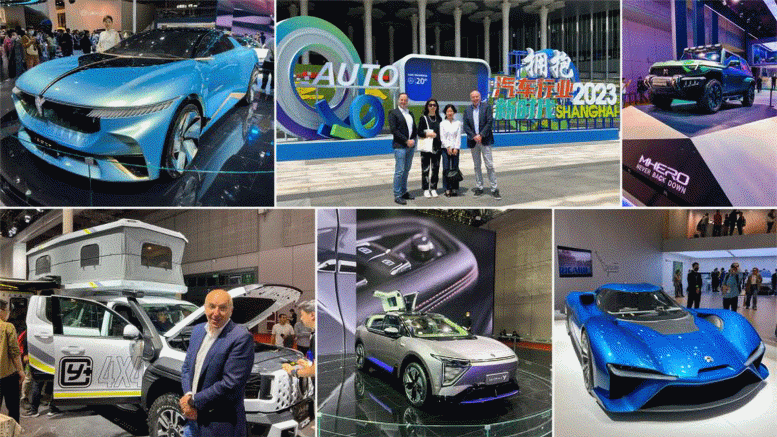As trends reshape the global auto industry, Portfolio Manager Werner Leinauer sees opportunities for the Volaris Automotive group to keep innovating for customers
Werner Leinauer’s introduction to the automotive industry sparked a passion that has defined his career.
His 35-year career initially started in management consulting and sales at Siemens in Germany. From there, he went on to build an international profile that took him to China, Egypt, Turkey, and Greece.
Now, he leverages his deep knowledge of the automotive sector in his M&A-focused role at Volaris, where he is a Portfolio Manager and head of the Volaris Automotive group.
I’m very happy in this environment. It’s a very interesting job and I can work in the industry I love, the automotive industry.
Werner sat down with Acquired Knowledge magazine to share his insights into industry trends, his experience at Volaris, and what could be next for the Volaris Automotive group.
You have a long history with incadea, a provider of automotive software that Volaris acquired in late 2018. Can you tell us more?
My relationship with incadea began more than a decade before the company was acquired by Volaris. It started when I became the CEO of a Greek company called Real Consulting in 2005, which focused on SAP and Microsoft ERP implementations. One of its partners was incadea, and that was my first connection to this company.
The two owners of incadea eventually asked me to set up a meeting with the owner of Real Consulting to discuss a possible acquisition. The deal was completed, and in 2008, I moved from Greece to Austria to become the CEO and Managing Director of incadea. One of my highlights while leading incadea was holding a successful IPO for the company on the London Stock Exchange in 2012.
In 2014, incadea was sold to Cox Automotive, and I had to decide whether to stay with Cox. My other option was to step out of the business and stay with the family office, which was still a majority owner of incadea. I decided to stay at the family office.
How did you end up making a return to incadea?
Unfortunately, incadea didn’t turn out to be a successful acquisition for Cox, and Cox decided to sell the company in 2018. Fortunately, Volaris was the acquirer. I met with Volaris Portfolio Leader Rick Bacchus at the time, and he convinced me to return to incadea.
The goal we set when I returned to incadea was to manage it back to a profitable company within the first 12 months, which we achieved. I’ve been with Volaris since 2019 and my scope has now expanded beyond incadea. Since July 2023, I have managed the Volaris Automotive portfolio, a group of companies that includes incadea, and I continue to work closely with the CEO of incadea.
After seeing incadea go through different ownership changes over the years, what would you say is different now that the company is in its forever home at Volaris?
It means a lot when you feel positive about the environment you work in. I appreciate everything from how people are trained and motivated by the corporate culture, to how companies are managed based on a set of KPIs—a practice that gives immediate insights about performance and profitability at each review.
This is something I haven’t seen in a family office environment or in big industry company environments. I’ve never been in an environment like Volaris.
As the head of the Volaris Automotive portfolio, you keep a close eye on what is happening globally in the industry. What are the trends you are observing?
We’re seeing a consolidation of dealers, with fewer owners and dealer groups getting bigger.
And we are seeing a shift in how vehicles are sold to the consumer. In Europe and Asia, we are seeing the dealership business model becoming less common. New cars are now commonly being sold through the agency model—meaning they are sold directly to the consumer by the original equipment manufacturer (OEM) or car manufacturer, and not by the dealer. This means dealerships have to refocus by going from selling cars to providing additional services, such as car renting and car sharing.
How are the software companies serving the automotive dealer industry adapting to current trends?
Consolidation impacts the software providers because larger groups typically will try to have just one software system in the entire group.
Since the core business model of an automotive dealership is changing, it means we have to change the software that serves them. In the past, dealer management software companies provided an end-to-end Enterprise Resource Planning (ERP) system for a dealership or for service outlets.
But now, since the OEM is taking on the role of selling new cars, a dealership may not need a sales module for new car sales in its ERP system anymore. But it may need new software modules, like car-sharing or renting modules that support new business processes that dealerships didn’t do before. Also, the used car market is becoming more important for dealerships.

Werner Leinauer visited Auto Shanghai 2023 while he was the CEO of incadea. The major international auto show is held every two years and is considered one of the premier international auto shows alongside shows in Detroit, Frankfurt, Paris and Tokyo. In addition to meeting with the local team at incadea, he met with customers and business partners. (Photo credit: incadea)
Why are you watching the automotive industry in China closely?
A lot of trends are coming out of China, so the market is an important part of our group’s global strategy as we move from established business models toward innovation and digitalization. I have visited often to meet with our local team and get firsthand market updates.
The electric vehicle (EV) market is almost entirely driven by Chinese OEMs. They are far more advanced in EV and battery system technologies compared to German OEMs. Chinese battery manufacturing plants are bigger, and the batteries are better, and European and American OEMs are far behind on EV trends compared to China.
There are 1.5 billion people in China, and China alone has around 80 to 85 different OEMs, which are not well-known to the rest of the world.
I think the Chinese model of car sales has high potential for success in the European market. If you buy a new electric car in China, you can choose between three models – the entry model, the mid-size, and the high-end model. All of the available features are already in the car. What the buyer can choose is the battery pack, the size, and the range—such as a battery with 400, 600, or 800 kilometers of range. It’s a bit of a different model compared to what OEMs did in Germany.
What is the influence of the European dealership model now?
Chinese OEMs are orienting themselves very strongly towards European OEMs, who have been leaders in a different way. The Europeans are quite experienced in building dealer and service networks all over the world.
As Chinese OEMs are now starting to move out of China into the European and South American markets, they are running at full speed to get their cars sold there, and they are using the existing network environment of European OEMs to do it.
So on one hand, China has a leading role in car technology, and on the other hand, it is following the European models into markets.
What do you see in the future for the Volaris Automotive group?
In March 2025, we added to our portfolio when we acquired Britehouse Automotive, which we mutually decided to rebrand to automate. It’s a comprehensive dealer management software provider with mobility solutions. Having automate join the Volaris Automotive portfolio further fuels our collaboration within the group.
There are only two markets where the companies in the Volaris Automotive group don’t have any customers at the moment: North America and the UK. But we expect we will change that in the near future.









